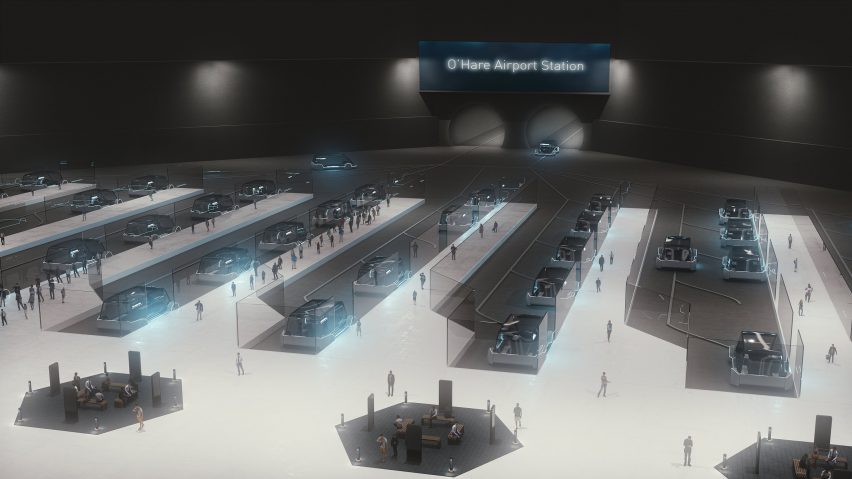Elon Musk's infrastructure firm The Boring Company has revealed plans to bring its super-fast tunnel system to Chicago, where "autonomous electric skates" travelling up to 150 miles per hour will link the city's Downtown area with O'Hare Airport.
The Boring Company's scheme was selected by the Chicago Infrastructure Trust (CIT) as the winning proposal bidding for the O'Hare Express service, the city's mayor Rahm Emanuel revealed yesterday.
Called Chicago Express Loop, it will provide a super-high-speed underground connection between O'Hare International Airport's Terminals 1-3 and Block 37 in Downtown Chicago, cutting the journey time to just 12 minutes.
This is much faster than the current options, which include the L train or driving via the often-congested expressway.
Passengers on the Chicago Express Loop will travel in driverless battery-powered pods, which will be pulled along a concrete track with electric lines at speeds of 125-150 miles per hour.
It is expected to be open 20 hours per day, every day of the week, with pods leaving each station every 30 seconds.
"Loop is a high-speed underground public transportation system in which passengers are transported on autonomous electric skates travelling at 125-150 miles per hour," said The Boring Company on its website.
"It will take 12-minutes to travel from O'Hare to downtown," it added. "The Chicago Express Loop is three to four times faster than existing transportation systems between O'Hare Airport and downtown Chicago."
Musk's company has already revealed plans for similar super-fast tunnel connections in Los Angeles, and between Washington DC and New York City, as part of its mission "to alleviate soul-destroying traffic by constructing safe, affordable, and environmentally-friendly public transportation systems".
The "skates" will provide zero-emissions, while burrowing underground allows for a more direct link, as well as minimising noise and vibration.
Renderings of the Chicago proposal reveal a station at O'Hare featuring a series of platforms. Passengers can hop on and off the pods, which are modelled on the Model X sports utility vehicle (SUV) by Musk's electric car brand Tesla.
Each will accommodate eight to 16 passengers, or a single passenger vehicle like a bicycle. Images show the vehicles to be glazed and fitted with benches, and luggage storage. The cabins will also be climate controlled and offer Wi-Fi connection.
The Boring Company, which Musk founded in 2016, will completely fund the project.
The scheme forms part of Musk's long-term mission to overhaul public transport systems, which he described as "a pain in the ass" in January 2018.
The billionaire entrepreneur – who is also CEO of SpaceX – is known for inventing the high-speed transport Hyperloop link in 2013, but is no longer directly involved with any companies developing the technology.
One of the largest, Hyperloop One, successfully tested full-scale pods at speeds up to 190 miles per hour last year, and was renamed Virgin Hyperloop One in October 2017 following a major investment from Richard Branson's company.
So far, Hyperloop lines have have also been proposed to link Dubai and Abu Dhabi; central European capitals Bratislava, Vienna and Budapest; and several urban areas between Mexico City and Guadalajara.
Images are courtesy of The Boring Company.

